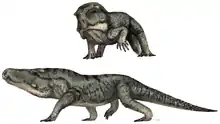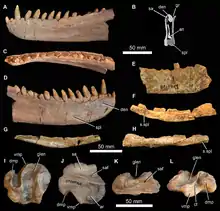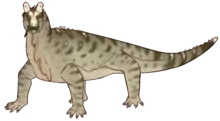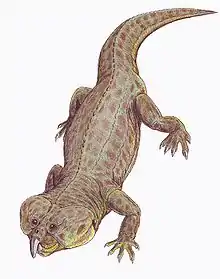Garjainia
Garjainia is an extinct genus of erythrosuchid archosauriform reptile from the Olenekian of Russia and South Africa.[1] It was approximately 1.50–2 m (5–6 ft 8 in) long. It contained two species, Garjainia prima from the Yarengian/Yarkenskian Supergorizont of Russia,[2] and Garjainia madiba from the Burgersdorp Formation (Cynognathus Assemblage Zone A) of South Africa.[3] "Vjuskovia triplicostata", a name assigned to some erythrosuchid fossils from Russia,[4] has been synonymized with Garjainia prima.[5][6]

| Garjainia | |
|---|---|
 | |
| Mandible elements of G. madiba | |
| Scientific classification | |
| Kingdom: | Animalia |
| Phylum: | Chordata |
| Class: | Reptilia |
| Family: | †Erythrosuchidae |
| Genus: | †Garjainia Otschev, 1958 |
| Species | |
| Synonyms | |
|
Genus synonymy
Species synonymy of G. prima
| |
Discovery
This prehistoric animal was discovered in a small village in Russia by a landowner when he was looking over his . The exact date of the discovery is not known but its believed to have been found some time in the early 1950s. An earlier find is the one that was found in South Africa in the 1960s. In this area another much larger spices was found called Erythrosuchus africanus this was the biggest predator of the early trissic (250 million years ago).
References
- Ezcurra, Martín D.; Gower, David J.; Sennikov, Andrey G.; Butler, Richard J. (2019-02-27). "The osteology of the holotype of the early erythrosuchid Garjainia prima (Diapsida: Archosauromorpha) from the upper Lower Triassic of European Russia". Zoological Journal of the Linnean Society. 185 (3): 717–783. doi:10.1093/zoolinnean/zly061. ISSN 0024-4082.
- Ochev, Vitalii G. (2004). "Materials to the tetrapod history at the Paleozoic-Mesozoic boundary" (PDF). Archived from the original (PDF) on January 16, 2006.
- Gower, David J.; Hancox, P. John; Botha-Brink, Jennifer; Sennikov, Andrey G.; Butler, Richard J. (2014-11-11). "A New Species of Garjainia Ochev, 1958 (Diapsida: Archosauriformes: Erythrosuchidae) from the Early Triassic of South Africa". PLOS ONE. 9 (11): e111154. Bibcode:2014PLoSO...9k1154G. doi:10.1371/journal.pone.0111154. ISSN 1932-6203. PMC 4227673. PMID 25386937.
- Gower, David J. (1996-04-01). "The tarsus of erythrosuchid archosaurs, and implications for early diapsid phylogeny" (PDF). Zoological Journal of the Linnean Society. 116 (4): 347–375. doi:10.1111/j.1096-3642.1996.tb00128.x. ISSN 0024-4082.
- Sennikov, A.G.; Gower, D.J. (2000). "Early archosaurs from Russia". In Benton, M.J.; Shishkin, M.A.; Unwin, D.M. (eds.). The Age of Dinosaurs in Russia and Mongolia. Cambridge: Cambridge University Press. pp. 140–159. ISBN 978-0-521-54582-2.
- Butler, Richard J.; Sennikov, Andrey G.; Dunne, Emma M.; Ezcurra, Martin D.; Hedrick, Brandon P.; Maidment, Susannah C. R.; Meade, Luke E.; Raven, Thomas J.; Gower, David J. (2019). "Cranial anatomy and taxonomy of the erythrosuchid archosauriform 'Vjushkovia triplicostata' Huene, 1960, from the Early Triassic of European Russia". Royal Society Open Science. 6 (11): 191289. doi:10.1098/rsos.191289. PMC 6894557. PMID 31827861.







